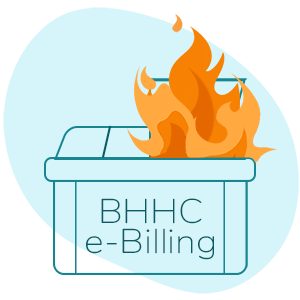AmTrust: Serious Violation of CA e-Billing Law

AmTrust North America refuses to comply with the most basic workers’ comp electronic billing mandates. In that refusal, AmTrust completely undermines the purpose of workers’ comp e-billing, which California legislators mandated to reduce friction, conserve resources, and make the treatment of injured workers more efficient.
AmTrust does not return electronic EORs (e-EORs) in response to provider e-bills. e-EORs significantly reduce providers’ administrative burden by automatically posting to the e-bill sent by the provider, closing the payment loop, and cutting the time and effort necessary to manage practice revenue.
Bottom line: failing to return e-EORs, as AmTrust did, places an undue strain on providers.
AmTrust’s brazen choice to ignore California law usurps the regulatory role of the Division of Workers’ Compensation (DWC). By picking and choosing which workers’ comp laws to ignore, AmTrust anoints itself as its own phantom regulator — and a poor one at that.
Billing Data Reveals AmTrust Non-Compliance
daisyBill’s Claims Administrator Directory tracks e-billing compliance data for the 593 claims administrators to whom our provider clients send bills. According to this data, for Q4 2021, AmTrust’s compliance record is effectively 0% when it comes to sending our e-billing providers the required e-EORs.
California requires claims administrators to timely respond to provider e-bills with e-EORs in the X12 835 file format. During the last quarter of 2021 alone, AmTrust did not directly return an X12 835 file to the provider in 7,721 cases.
Note: In Q4 2021 daisyBill providers who e-billed AmTrust received electronic EORs from network payers that paid on behalf of AmTrust, rather than from AmTrust directly, in 8 cases (6 timely and 2 late).
AmTrust did not confine its non-compliance to Q4 2021; data for all of 2021 reveals that AmTrust consistently ignores California workers’ comp e-billing requirements.
AmTrust Ignores CA Law (and daisyBill)
daisyBill contacted TEN AmTrust representatives via email to address this pattern of non-compliance on April 4, 2022. For the Q4 data noted above, daisyBill sent the ten AmTrust representatives a spreadsheet detailing each violation for each missing e-EOR.
As of this writing, AmTrust has offered no indication of taking any substantive action to correct the problem.
Due to the lack of any response from AmTrust (or even apparent concern), daisyBill submitted 31,514 Audit Complaints to the DWC Audit Unit to report the insurer’s e-EOR non-compliance. The 31,514 Audit Complaints represent each instance from January 1, 2021 through December 31,2021 where AmTrust failed to send our provider client the required e-EORs in response to the provider’s e-bill.
Claims Administrators Act as Phantom Regulators
Claims administrators like AmTrust openly refuse to submit to reasonable California workers’ comp laws and regulations. This leaves few options for providers trying to treat injured workers, other than abandoning workers’ comp altogether.
Without decisive action to curb AmTrust’s excesses, it is clear that the electronic EOR mandate is yet another requirement that claims administrators — in their usurped role as phantom regulators of their own business practices — can disregard.
If the DWC is not equipped to properly challenge AmTrust, California legislators can watch from the sidelines as the laws they created are systematically ignored.
CA e-Billing Laws, Regulations, and Rules Violated by AmTrust
Timely sending an electronic EOR is not optional in California. California Labor Code (LAB) Section 4603.4 mandates the DWC Administrative Director (AD) “adopt rules and regulations” to:
“(c) Require all employers to accept electronic claims for payment of medical services. [emphasis added]”
Further, Section 7.1 of the DWC Medical Billing and Payment Guide states:
“…the ASC X12N/005010X221 A1 Health Care Claim Payment/Advice (835) must be transmitted to the provider within 15 working days of receipt of the electronic bill…[emphasis added]”
“...payment for uncontested medical treatment…shall be made by the claims administrator within 15 working days after electronic receipt of an itemized electronic billing…[emphasis added]”
AmTrust Violations Warrant A TARGETED Audit
We believe that AmTrust’s behavior constitutes a disregard for workers’ comp requirements that meets the standards for a DWC Targeted Audit. LAB §129(b)(3) empowers the DWC to conduct either a “targeted profile audit review” or “full compliance audit” at any time, based on information from:
“...reliable sources providing factual information that indicates an insurer, self-insured employer, or third-party administrator is failing to meet its obligations…”
Pursuant to LAB §129, CCR §10106.1(c)(3) provides the DWC Audit Unit may target audit subjects based on:
“...credible complaints and/or information received by the Division of Workers' Compensation that indicate possible claims handling violations…”
daisyBill has submitted 31,514 reliable and credible Audit Complaints to the DWC regarding AmTrust’s apparent business practice of violating California e-billing requirements.
AmTrust Subject to Audit Penalties
Per §7.2 of the DWC Guide, audit penalties under California Code of Regulations (CCR) Section 10111.2(b)(10),(11) apply to AmTrust.
Audit penalties are separate and distinct from penalty and interest payments owed to the provider; while penalty and interest payments are automatic and “self-executing” by AmTrust, audit penalties are only due if the DWC selects the claim for audit.
Where the e-bill remains unpaid (or compliantly objected to) at the time the DWC notifies AmTrust that the claim was selected for audit, the penalty is:
- $100 for each bill of $100 or less, excluding interest and penalty
- $200 for each bill of more than $100, but no more than $500, excluding interest and penalty
- $300 for each bill of more than $500, but no more than $1,000, excluding interest and penalty
- $500 for each bill of more than $1,000, excluding interest and penalty
The above payments are doubled when the treatment was authorized by a reviewer, as defined by CCR §9792.6(q), through a utilization review (UR) process established pursuant to LAB §4610 and CCR §9792.7.
Where AmTrust paid the bill before receiving notification that the DWC selected the claim for audit, the penalty for each failure to pay is:
- $100 for each bill that included an increase and interest with the late payment
- $200 for each bill that included either an increase or interest with the late payment
- $300 for each bill that included neither an increase nor interest with the late payment
Administrative and Civil Penalties
LAB §129.5 allows the AD to assess administrative penalties against claims administrators, ranging from $100 to $5,000 per violation, for failure to comply with any rule or regulation of the AD. The AD must give “due consideration” to:
- The gravity of the violation: AmTrust blatantly and repeatedly disregarded a key e-billing requirement.
- The good faith of the claims administrator: it is inconceivable that AmTrust was unaware of its obligations (Starting October 2012 the DWC required claims administrators to send providers electronic EORs).
- The frequency of the violations: AmTrust committed the same violation 31,514 in a single year.
In addition, the AD may assess a civil penalty of up to $100,000 against a claims administrator if:
“Upon finding, after hearing, that an employer, insurer, or third-party administrator has knowingly committed, or performed with enough frequency as to indicate a general business practice…a refusal to comply with known and legally indisputable compensation obligations [emphasis added].”
daisyBill fights the good fight on behalf of workers’ comp providers. Reach out to see how we can help your practice obtain fast, correct reimbursement for treating injured workers.
LET’S TALK
DaisyBill provides content as an insightful service to its readers and clients. It does not offer legal advice and cannot guarantee the accuracy or suitability of its content for a particular purpose.



.gif)
